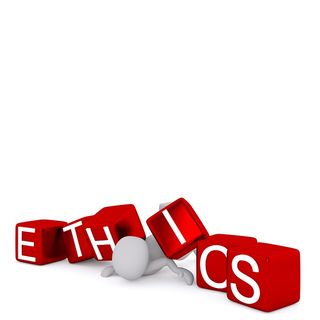Deception
Is It Always Wrong to Lie?
Exploring the morality of deception.
Posted June 13, 2019 Reviewed by Devon Frye
Is lying ever the right thing to do? Are there some situations in which dishonesty is morally justified? Are there good and noble lies? These questions concerning the ethics of lying are more than trivial curiosities for armchair philosophers. They are quite consequential in our day-to-day lives.
Most people would argue that lying to people in order to swindle them out of money would be immoral. Is it also immoral to lie to a child about Santa Claus? Is it immoral for a doctor to spare a person’s feelings by telling them that their family member died quickly and peacefully, when, in fact, they died a slow, horribly agonizing death?

A good place to begin exploring the rightness or wrongness of lying is an examination of morality more broadly. The ethics and morality of behavior have been considered by philosophers and psychologists for ages, but recent experimental work has revealed the underlying psychology of our moral judgments.
Work by psychologist Kurt Gray and others indicates that we deem acts to be immoral when we sense that a person knowingly does something harmful to another individual who feels that harm. In the context of lying, that means that people perceive a lie as immoral if one person knowingly tells a lie that inflicts harm that is felt by another.
Disagreements about the morality of a lie seem to stem from ambiguity about the degree to which the lie caused harm. Clearly, we don’t perceive all types of lies as being equally bad and immoral, and this variability seems to be tied to the amount of harm the lies cause.

Some deception researchers have differentiated between broad classes of lies. One such category is the self-interested lie. This type of lie is exploitative in nature. Liars tell these types of lies in order to gain or retain an advantage over others. Examples include lying about one’s qualifications in a job interview or lying to a spouse about one’s whereabouts to avoid a confrontation. These lies give the liar an advantage while placing the dupe at a disadvantage.
Another category of lie is the other-oriented lie. These lies are told with the motivation to help or protect others. These lies are altruistic in intent. Examples include benevolent white lies such as telling someone their new haircut looks great when it really doesn’t. This category also includes paternalistic lies people tell in order to help someone. For instance, if a woman knows that her husband is trying to lose weight but is also struggling to stay on his diet, she might tell him that all of the cookies are gone, when they are actually hidden away in the pantry. Are both self-interested and other-oriented lies immoral? Most people believe that the exploitative self-interested lies are immoral, but are less certain about the moral position of other-oriented lies.
The moral quandary around other-oriented lies plays out in varied contexts. Consider the position of nurses who work in adult care facilities with people suffering from dementia. Is it permissible to lie to these patients? If a patient with dementia repeatedly asks a nurse when her husband is going to visit, forgetting that her husband actually died years ago, should the nurse repeatedly remind the patient that her husband is dead? Would a gentle lie such as, “maybe later,” be more humane and ethical?
In one study carried out with nurses who work in such a setting, over 90 percent of them believed it was ethical to lie to their patients. However, they saw ethical distinctions depending on the nature of the lie. For instance, 92 percent of them thought it was ethical to lie to patients in order to reduce aggressive behavior, but only 36 percent thought it was ethical to lie in order to save time dealing with patients.
How do we decide if lies are morally permissible or not? The process for making these types of moral decisions typically falls into one of two approaches: deontological perspectives or consequential perspectives.
Proponents of the deontological perspective argue that the morality of lying rests in the inherent and universal rightness or wrongness of the act. That is, there are certain rules, maxims, cultural values, or religious laws, often described as natural laws, that we are morally bound to uphold. The imperative of honesty is one such natural law. From the deontological perspective, honesty is inherently good and lying is inherently evil, so we are duty bound to be truthful. Thou shalt not lie!
On the other hand, the consequentialist perspective argues that the morality or immorality of a lie depends on the consequences or outcomes of the lie. From this perspective, some lies can be good and others can be bad, depending on their outcomes. If a lie produces a good, it is good, moral, and allowable. If it produces harm, it is bad, immoral, and not allowable.

When it comes to exploitative self-interested lies, both the deontological and the consequential perspectives would characterize the lie as immoral. Through the deontological lens, self-interested lies are wrong because cultural and religious rules tell us that all lies are wrong. Through the consequentialist lens, a self-interested lie is also wrong because such lies necessarily exploit or harm others, thus the outcome is a negative one. But what of the other-oriented lies?
The deontological perspective would lead to a conclusion that other-oriented lies are also immoral because they are still lies, and all lies violate the maxim against dishonesty. We should always be truthful.
However, the consequentialist perspective on other-oriented lies is not as clear-cut. It may be the case that some other-oriented lies lead to positive consequences. So, this would lead to the conclusion that it is morally acceptable to tell some lies, as long as the lie results in help, not harm.

I knew an elderly woman whose family members lied to her about the fact that her son was dying of cancer. Rather than telling the elderly woman that her son was in the hospital, they told her that her son was on a long business trip to Green Bay, Wisconsin. They told this lie in an altruistic attempt to spare the elderly woman the emotional pain of learning that her son was dying. Was that lie morally acceptable? From their consequentialist perspective, their lie was morally justified because it hurt no one and it prevented emotional pain. It was, they argued, a good lie. But was the lie actually harmless?
In his essay titled "Lying," the author Sam Harris argues that there are no good lies. He reasons that all lies, no matter how trivial or well-intentioned, ultimately cause harm. His stance is that all lies erode autonomy. That is, by robbing someone of the truth, you steal away their opportunity to freely make decisions based on the facts of reality. For instance, he would argue that we should not lie to a person about their family member who is dying because such a lie would prevent them from emotionally preparing for the eventuality of their family member’s death. Further, it would prevent them from saying last goodbyes, sharing true feelings, offering deathbed forgiveness, etc.
Harris also argues that these supposedly altruistic lies actually cause harm by undermining the trust that we all have in each other. After all, if I see you lying to your grandmother in order to spare her feelings, how can I trust that you will be forthright with me when you have some serious information that might affect me? On a broader societal level, Harris argues that when we speak dishonestly, we also harm the fabric of society by violating the trust that binds us all together. Perhaps all lies, despite any good motives behind them, are harmful in the end.

Are there any exceptions? Are there lies that are good both in the moment and in the long view? There is a classic thought experiment used to explore this question. Imagine that you are in Nazi-occupied Europe during World War II. Imagine you are strolling down an alleyway, and suddenly a Jewish child runs past you. As he ducks into a darkened stairwell, he pleads with you, “Please don’t tell the Germans that you saw me, or they will kill me.” Moments later a group of Nazi soldiers run around the corner and ask you, “Did you just see a small child around here?” Would you tell the truth or would you lie? Most people who are asked this question answer that they would lie. They usually report that it would be immoral to tell the truth and it would morally correct to lie. Their consequentialist reasoning is that the lie will spare the life of the child, while causing no real harm to anyone else. Furthermore, many argue that it is not immoral to lie to the Nazis because, owing to their own moral corruption, they do not deserve the truth. In fact, I believe that if you admitted that you would honestly report the location of the child to the Nazis, most people would find you morally reprehensible. That is, by being honest you would be viewed as a moral violator. For most people, consequentialism seems to beat out deontology in this case. Perhaps there are a narrow set of lies that most people view as the good or the moral lies.
So how do we decide when it is acceptable to lie and when it is not? Is there any guiding criterion or any consensus about which lies are the morally acceptable ones? Consensus is exactly what the philosopher Sissela Bok advocated for in her seminal book, Lying: Moral Choice in Public and Private Life. First, it should be noted that Dr. Bok is very much opposed to lying. However, she acknowledges that an absolutist position on prohibitions against lying is not tenable.
She argues that in some rare instances, it may be morally acceptable to tell a lie. Bok argues that when we make a decision about whether it is appropriate to lie, we should ask two questions. First, she argues that we should ask ourselves if there is a more honest alternative action we could take instead of telling a lie.
If there is not, the question we should ask ourselves is whether our lie passes the reasonable person test. If we presented our lie to a jury of reasonable peers, would they unanimously agree that our lie was morally acceptable? Sometimes, our immediate circumstances do not allow us to consult peers about the morality of a lie, and so we must consult an imaginary group of reasonable people.
Obviously, we tend to be biased in our own favor when guessing what others would find justifiable, so we must be as honest with ourselves as possible. If our own conscience tells us that the lie is necessary, and if we find that a panel of reasonable people would find the lie justifiable, only then, Bok argues, can we ethically tell a lie. I believe that Bok’s analysis would let you off the hook if you lied to Nazis in order to spare the life of a child.
We behave immorally when we knowingly do something harmful to another person who feels that harm. Our lies often cause harm, even though that harm may not always be readily apparent to us. If we are honest with ourselves—really honest—and we take the time and effort to openly consider the many ways that even our supposedly trivial white lies might cause damage or harm to others or to society, we might find that the number of lies we once saw as morally justifiable shrink down to a minuscule number of ethically defensible falsehoods.

Challenging ourselves to be completely honest all of the time is arduous. From childhood, most of us are taught that there are certain social niceties that require us to deceive in order to protect others’ feelings or to preserve social harmony.
Perhaps if we try to be completely honest even when it is difficult, there will be large benefits that outweigh any immediate social costs. It may be that total honesty will strengthen our relationships as our peers see us as more genuine and vulnerable. If we are always truthful, people may learn that they can always trust us at our word and can ultimately count on us for our honest point of view. Being entirely honest would also remove the screens of deception that we use to conceal our bad behaviors and manage impressions, so perhaps it would drive us to live more honorable and virtuous lives. Maybe treating our little everyday lies as immoral and avoiding them will lead us all to become better people.
References
Bok, S. (1999). Lying: Moral Choice in Public and Private Life. New York: Pantheon Books.
Schein, C., & Gray, K. (2018). The theory of dyadic morality: Reinventing moral judgment by redefining harm. Personality and Social Psychology Review, 22(1), 32–70.
Harris, S. (2013). Lying. Four Elephants Press.




